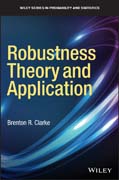
A preeminent expert in the field explores new and exciting methodologies in the ever–growing field of robust statistics Used to develop data analytical methods, which are resistant to outlying observations in the data, while capable of detecting outliers, robust statistics is extremely useful for solving an array of common problems, such as estimating location, scale, and regression parameters. Written by an internationally recognized expert in the field of robust statistics, this book addresses a range of well–established techniques while exploring, in depth, new and exciting methodologies. Local robustness and global robustness are discussed, and problems of non–identifiability and adaptive estimation are considered. Rather than attempt an exhaustive investigation of robustness, the author provides readers with a timely review of many of the most important problems in statistical inference involving robust estimation, along with a brief look at confidence intervals for location. Throughout, the author meticulously links research in maximum likelihood estimation with the more general M–estimation methodology. Specific applications and R and some MATLAB subroutines with accompanying data sets available both in the text and online are employed wherever appropriate. Providing invaluable insights and guidance, Robustness Theory and Application: Offers a balanced presentation of theory and applications within each topic–specific discussion Features solved examples throughout which help clarify complex and/or difficult concepts Meticulously links research in maximum likelihood type estimation with the more general M–estimation methodology Delves into new methodologies which have been developed over the past decade without stinting on coverage of tried–and–true methodologies Includes R and some MATLAB subroutines with accompanying data sets, which help illustrate the power of the methods described Robustness Theory and Application is an important resource for all statisticians interested in the topic of robust statistics. This book encompasses both past and present research, making it a valuable supplemental text for graduate–level courses in robustness. INDICE: Dedication .Foreword .Preface .Acknowledgments .Notation .Acronyms .About the companion website .Chapter 1: Introduction to Asymptotic Convergence .1.1 Introduction .1.2 Probability Spaces and Distribution Functions .1.4 The Modus Operandi Related by Location Estimation .1.5 Efficiency of Location Estimators .1.6 Estimation of Location and Scale .Problems .Chapter 2: The Functional Approach .2.1 Estimation and Conditions A .2.2 Consistency .2.3 Weak Continuity and Weak Convergence .2.4 Fréchet Differentiability .2.5 The Influence Function .2.6 Efficiency for Multivariate Parameters .2.7 Other Approaches .Problems .Chapter 3: More Results on Differentiability .3.1 Further Results on Fréchet Differentiability .3.2 M–estimators – Their Introduction .3.3 Regression M–estimators .3.4 Stochastic Fréchet Expansions and Further Considerations .3.5 Locally Uniform Fréchet Expansion .3.6 Concluding Remarks .Chapter 4: Multiple Root Problems .4.1 Introduction to Multiple Roots .4.2 Asymptotics for Multiple Roots .4.3 Consistency in the Face of Multiple Roots .Chapter 5: Differentiability and Bias Reduction .5.1 Differentiability, Bias Reduction and Variance Estimation .5.2 Further Results on the Newton Algorithm .Problems .Chapter 6: Minimum Distance Estimation and Mixture Estimation .6.1 Minimum Distance Estimation and Revisiting Mixture Modelling .6.2 The L2–Minimum Distance Estimator for Mixtures .6.3 Other Minimum Distance Estimation Applications .Problems .Chapter 7: L–estimates and Trimmed Likelihood Estimates .7.1 A Preview of Estimation Using Order Statistics .7.2 The Trimmed Likelihood Estimator (TLE) .7.3 Adaptive Trimmed Likelihood and Identification of Outliers .7.4 Adaptive Trimmed Likelihood in Regression .7.5 What to do if n is Large? .Problems .Chapter 8: Trimmed Likelihood for Multivariate Data .8.1 Identification of Multivariate Outliers .Problems .Chapter 9: Further Directions and Conclusion .9.1 Further Directions and Conclusion .Problem .A Specific Proof of Theorem 2.1 .B Specific Calculations in Examples 4.1 and 4.2 .C Calculation of Moments in Example 4.2 .Bibliography .Index
- ISBN: 978-1-118-66930-3
- Editorial: Wiley–Blackwell
- Encuadernacion: Cartoné
- Páginas: 240
- Fecha Publicación: 20/07/2018
- Nº Volúmenes: 1
- Idioma: Inglés
